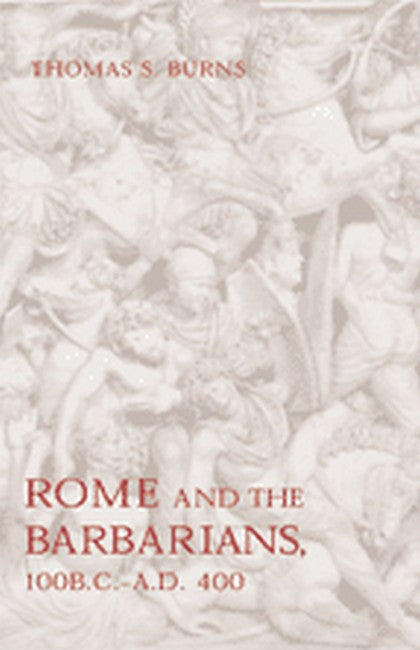The barbarians of antiquity, so long a fixture of the public imagination as the savages who sacked and destroyed Rome, emerge in this colourful, richly textured history as a much more complexand far more interestingfactor in the expansion, and eventual unmaking, of the Roman Empire. Thomas S. Burns marshals an abundance of archeological and literary evidence, as well as three decades of study and experience, to bring forth an unusually far-sighted and wide-ranging account of the relations between Romans and non-Romans along the frontiers of western Europe from the last years of the Republic into late antiquity. Looking at a 500-year time span beginning with early encounters between barbarians and Romans around 100 B.C. and ending with the spread of barbarian settlement in the western Empire around A.D. 400, Burns removes the barbarians from their narrow niche as invaders and conquerors and places them in the broader context of neighbours, (sometimes bitter) friends, and settlers. His nuanced history subtly shows how Rome's relations with the barbariansand vice versaslowly but inexorably evolved from general ignorance, hostility, and suspicion toward tolerance, synergy, and integration. What he describes is, in fact, a drawn-out period of acculturation, characterized more by continuity than by change and conflict and leading to the creation of a new Romano-barbarian hybrid society and culture that anticipated the values and traditions of medieval civilization.''Burns brings thirty years of extensive study of the literary and archaeological evidence to bear on the nature of the impact not only that the Romans had on the barbarians but also that the barbarians had on the Romans. Fortified with a thorough exposition of the source material, meticulous analysis, and provocative suggestions, Rome and the Barbarians will take the dialogue to another level.''Ralph W. Mathisen, University of South Carolina''An excellent book that comes from eleven years of painstaking research. Thomas S. Burns has written a readable and well-documented survey of Rome and the numerous peoples to its north . . . The book is exceptionally well organized . . . This book is useful for research and in the classroom not only because of its extensive documentation and bibliography but also because it is readable both for scholars and students.''John F. DeFelice, History: Reviews of New Books''An excellent study . . . Burns breaks the stereotype of the barbarians as destructive savages held in check by the Roman Empire. In its place he offers a balanced view of an evolving relationship between complex, diverse societies on the barbarian side and the civilized Romans . . . The book is enhanced by Burns's very effective integration of the traditional literary sources with the testimony of archaeological evidence . . . Sheds light on an important aspect of Roman history and is valuable to both the scholar and the beginning student.''J. P. Karras, Journal of Military History''Anyone who has struggled to convey to a class the manifold ways in which the establishment of a legionary fortress revolutionized the life of a region will envy Burns' pedagogical fluency.''Michael Kulikowski, Bryn Mawr Classical Review''I recommend the book highly as an informed, up-to-date, and well-written review of a huge amount of data, easily readable and well referenced.''Peter S. Wells, International History Review''This detailed analysis of Roman-barbarian interaction rests on a very solid scholarly base.''Choice''Rome and the Barbarians, is a book that will delight both academics and their students.''Gocha R. Tsetskhladze, Ancient West and East''A thought-provoking analysis . . . A good foundation upon which future studies can build.''James Chlup, Ordia Prima''A remarkably even-handed portrait of Roman-northern action and reaction.''Frank M. Clover, Classical Review

